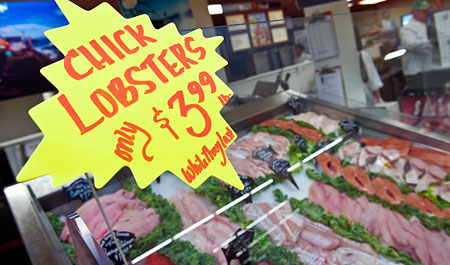|
|
Erik Anderson, a lobsterman who fishes out of Portsmouth, says an unexpected glut of lobsters that has sent prices tumbling may not be all bad news for those struggling to make a living catching the tasty crustaceans.
With chicken lobster selling for $3.99 a pound locally, Anderson says more people are willing to buy and try lobster -- and, hopefully, they’ll keep coming back for more, even when prices rise to more sustainable levels. Smaller lobsters weighing a pound or less, chicken lobsters cost about $6 a pound before the glut hit markets this spring.
“We’ve got to get people out of the mindset that lobster is a luxury item that they only buy for a special occasion,” Anderson says. “And right now, lobster is just about competing price-wise with hot dogs and baloney.”
University of New Hampshire fisheries experts are among those tracking the unexpected jump in the lobster catch in northern New England this spring and early summer. “This is really an unusual year, so there’s nothing you can really compare it to,” says Win Watson, UNH professor of zoology and a noted lobster researcher.
Following last winter’s mild temperatures, fishermen saw a sudden increase in their hauls this spring, indicating that the lobsters were shedding their hard shells for new soft shells and moving near shore months earlier than usual. The soft-shelled lobsters usually don’t start showing up in local traps in abundance until late June.
“Clearly this huge catch right now is due to the weather -- record warm winter and spring and summer,” Watson says. “Their growth, molting, etc. are very temperature dependent. So, they are all molting early and are available to be captured.”
With supply suddenly outstripping demand, prices have plummeted to levels fishermen haven’t seen in years. In Maine, some lobstermen stopped fishing earlier this month in an effort to ease the glut. And those who did fish said prices are so low that they’re struggling to cover their operating costs.
Watson says there’s a chance that the warmer waters that spurred the early catch may also prompt lobsters to grow to legal-size more quickly – shedding their shells twice this year, instead of just once as they usually do. Some lobsters in the traditionally warmer waters of the Great Bay already shed their shells twice a year, and the same phenomenon could now happen off shore as ocean waters warm.
Erik Chapman, fisheries program coordinator for New Hampshire Sea Grant at UNH, has been meeting with New Hampshire’s lobster fishermen to talk about the market. The glut has found the price fishermen get for their catch drop to about $2.50 a pound, not enough for many to cover the costs of fuel, equipment, insurance, and labor. One approach to boosting prices may be in educating consumers to see that soft-shelled lobsters are every bit as desirable as hard-shelled lobsters, which fetch higher prices. Federal assistance may also be sought if the glut continues.
In the meantime, lobstermen like Anderson are continuing to fish, hoping that prices surge as lobster-lovers plan their end-of-summer celebrations.
Originally published by:
UNH Today
Written by Jim Graham, Editorial and Creative Services. Photos by Mike Ross, UNH Photographic Services.















































